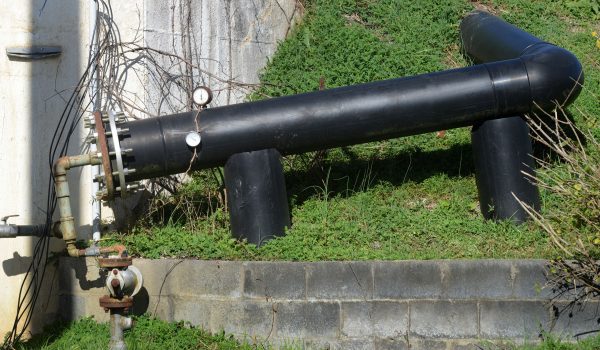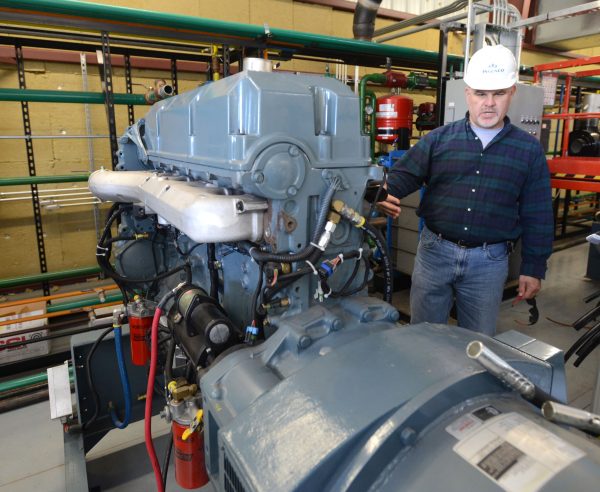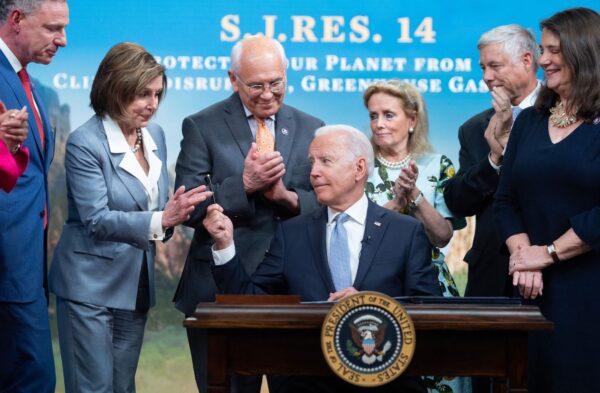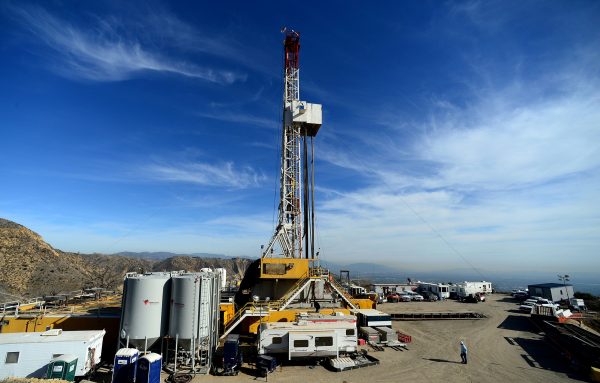
In this December 2012 photo, a flock of geese fly past the smokestacks at the Jeffrey Energy Center coal power plant near Emmett, Kan.
House Republicans want to eliminate a tax on methane emissions and do away with a “greenhouse gas” reduction grant program as part of their “Unleash America’s Energy” campaign to roll back regulatory restraints on domestic production in the United States.
A proposed ‘Natural Gas Tax Repeal Act,’ sponsored by Rep. August Pfluger (R-Texas), would eliminate the Methane Emissions Reduction Program (MERP) and its methane waste fee.
A yet-unnumbered bill calls for repeal of the Greenhouse Gas Reduction Fund, a $27 billion program administered through the Clean Air Act to support low- and zero-emission technologies to “reduce greenhouse gases and other air pollution in low-income and disadvantaged communities.”
Both MERP and the Greenhouse Gas Reduction Fund were established with the November 2021 adoption of the Inflation Reduction Act (IRA).
The repeals are within a 17-bill “Unleash America’s Energy” package introduced by House Republicans since January. Other measures seek to expand domestic oil and natural gas exports, secure critical minerals supplies, and reform regulations in key environmental laws, such as the Clean Air Act and Toxic Substances Control Act.
The bills were vetted in Feb. 7–9 hearings in Washington, and in Feb. 13–16 Texas field hearings. They will occupy House Natural Resources and Energy & Commerce committees’ agendas when Congress returns to Washington on Feb. 27. Some could be on the House floor by late March.

No EPA Taxing Authority
Section 60113 of the IRA establishes MERP, which creates a fee on methane emissions paid by the oil and gas industry, starting at $900 per ton in 2024 and increasing to $1,500 per ton by 2026.
The IRA requires producers of emissions exceeding 25,000 tons of “CO2 equivalent” to collect data historically reported under the Clean Air Act to the Greenhouse Gas Reporting Program as the basis for a new realm of taxation.
MERP’s fee “is an inappropriate and unworkable methane emissions tax” derived by dividing the calculated weight of methane by the sales volume of natural gas and heat content,” Independent Petroleum Association of America (IPAA) President and CEO Jeff Eshelman said in Washington hearings.
Emissions are already regulated under the Clean Air Act, he said, calling MERP “a redundant effort” that will “impose financial and filing burdens on independent American oil and natural gas producers” and “add another complexity to these small businesses and divert their attention from what they do best, produce the cleanest and safest barrels of oil and natural gas in the world.”
A week later during a field hearing in Midland, Texas, IPAA Board Chair Steven Pruett raised similar issues with MERP, claiming “none of the tools the law uses to generate the tax were ever designed to be used for this purpose,” adding it appears the regulations were “drafted by environmental firms that know nothing about our business.”
Both expressed concern about MERP giving “a tax collection function” to the U.S. Environmental Protection Agency (EPA).
Eshelman said MERP will “trigger complex audit challenges and the potential for abusive use” of laws by federal agencies. “The methane tax would add the burden of moving EPA into tax collection, including audit processes which involve a degree of accuracy in measurement and tax assessment that goes well beyond the agency’s capacity,” he said.
“EPA never taxed anything before,” Pruett said in Texas a week later, calling giving “the EPA a license to tax our industry as they see fit … unnerving.”

$1.5 Billion in Compliance Grants
Rep. Scott Peters (D-Calif.) told Pruett he would keep IPAA’s views in mind in pondering changes to MERP, musing that the methane rule appears to be “a square peg in a round hole,” but just the first stab at “getting the mechanics of it right.”
MERP also has a $1.5 billion fund that oil and gas operators can tap into to upgrade equipment to meet methane emission standards, Democrats and consumer advocates said.
“The law provides ample incentives for industry to avoid paying the fee, makes the industry a partner in effective regulation, ”Public Citizen Energy Program Director Tyson Slocum told lawmakers in Washington, calling MERP repeal “unnecessary” since “companies have been able to underreport methane emissions by exploiting loopholes in reporting [and through] of the use of certain oil-field devices.”
“There is money that will help producers comply and I will ensure grant money gets to communities in Texas and Oklahoma,” Peters vowed during the field hearing.
“I don’t think members will sign up for those grants,” Pruett said of his association’s 6,000 independents..
“Producers distrust the EPA,” he said, and accepting MERP grants would be an invitation for federal agencies to “lift the hood on all your practices. Some [producers] are not in compliance [with all regulations all the time]. The irony is these are the ones who need the funding the most.”

Greenhouse Gas Fund ‘Dangerous’
The IRA also establishes the Greenhouse Gas Fund, a $27 billion program “to support the rapid deployment of low- and zero-emission technologies” with most funding dedicated to projects that reduce greenhouse gases in low-income and disadvantaged communities.
House Republicans want to repeal the fund’s incorporation into Section 134 of the 1972 Clean Air Act, where it is set to provide up to $370 billion in grants and financial assistance to states, municipalities, tribal governments, and nonprofits for zero-emission technologies to be developed over the next 10 years.
Former Department of Energy (DOE) Deputy Secretary Mark Menezes said during the Washington hearings that while the fund is “well-intentioned” it is also “dangerous” because it comes with little oversight, appropriating only $25 million to the Government Accountability Office (GAO) to audit EPA’s use or monitor how the funds are used.
Menezes, noting EPA’s annual budget request in 2022 was $11.4 billion, said the $27 billion allocation itself is enough to call for a pause to reconsider.
“To put $27 billion in perspective,” he said, the U.S. Energy Information Administration “estimates the U.S. per capita average energy expenditures per year is around $3,500. The $27 billion amount given to EPA would be equal to Congress footing the bill for over 7.7 million people for an entire year— that’s the combined population of almost nine states.”
Manufacturing, & Critical Materials Subcommittee Chair Rep. Bill Johnson (R-Ohio) told those at the Midland hearing that “repealing the wasteful Greenhouse Gas Reduction Fund” is a top priority for the nation’s independent oil and gas producers, who generate more than 90 percent of the nation’s energy resources.

Fund to Fuel ‘Decarbonized Grid’
During the Feb. 7 hearing before the House Energy & Commerce Committee, Democrats argued the fund will leverage billions into trillions in green energy technologies needed to ensure American energy independence and keep the nation economically competitive through the “rapid production of pollution-reducing technologies,” Rep. Frank Pallone (D-N.J.) said.
Earthjustice Legislative Director for Healthy Communities Raul Garcia said the Greenhouse Gas Reduction Fund will “speed up distributed solar energy so people could have energy in their own homes so if a grid goes down, it’s not a problem for an entire state.”
Rep. Paul Tonko (D-N.Y.) said the fund “is going to facilitate historic investments to decarbonize our grids, our transportations system, and buildings while supporting well-paying jobs.”
He said the repeals are among bills filed by Republicans seeking to carve “new loopholes to important environmental laws” that are being “fast-tracked … with little concerns for Americans’ air, water, and safety.”
Proponents are saying “We want to give industries loopholes they can use so they don’t have to comply with the Clean Air Act, the Toxic Substances Act” among other environment laws, including the Solid Waste Management Ac, Garcia said.
“These laws were established by this Congress in bipartisan fashion to protect the air we breathe, the water we drink, the make-up we put on our faces, the food we put in our stomachs. They’re saying, ‘We want to peel that away.’”
https://www.theepochtimes.com/house-gop-puts-new-methane-tax-greenhouse-gas-fund-on-chopping-block_5070778.html